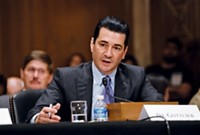Advertisement
Grab your lab coat. Let's get started
Welcome!
Welcome!
Create an account below to get 6 C&EN articles per month, receive newsletters and more - all free.
It seems this is your first time logging in online. Please enter the following information to continue.
As an ACS member you automatically get access to this site. All we need is few more details to create your reading experience.
Not you? Sign in with a different account.
Not you? Sign in with a different account.
ERROR 1
ERROR 1
ERROR 2
ERROR 2
ERROR 2
ERROR 2
ERROR 2
Password and Confirm password must match.
If you have an ACS member number, please enter it here so we can link this account to your membership. (optional)
ERROR 2
ACS values your privacy. By submitting your information, you are gaining access to C&EN and subscribing to our weekly newsletter. We use the information you provide to make your reading experience better, and we will never sell your data to third party members.
Pharmaceuticals
U.S. FDA wants more generic drug-device combos
Agency will outline ways for generic drug developers to gain approval for copycat inhalers and autoinjectors, commissioner says
by Ryan Cross
December 4, 2017
| A version of this story appeared in
Volume 95, Issue 48

U.S. Food & Drug Administration Commissioner Scott Gottlieb is continuing his push for cheaper drugs by making approvals of generics easier.
FDA is committed to giving guidance on how companies can develop copycat products on complex drugs at least two years before the branded product’s patent expires, Gottlieb said on Nov. 28. He spoke at FDA’s Generic Drug Science Day in Silver Spring, Md.
Complex formulations and active ingredients make some drugs difficult to copy. Drug-device combinations, such as inhalers or autoinjectors, are particularly tricky, since the device can be protected with new patents while the drug itself is decades old.
For instance, Mylan’s EpiPen autoinjector contains epinephrine, a hormone first synthesized over 100 years ago. Mylan protested when other companies submitted generic drug applications for an epinephrine autoinjector, arguing that design changes confuse users.
Adrenaclick is a cheaper alternative to the EpiPen. But because of design differences, it’s not considered a bona fide generic, meaning a pharmacist can’t substitute Adrenaclick when a doctor prescribes EpiPen.
Gottlieb announced his intentions to help generic drug developers work around issues like this, saying approvals may allow for some design differences in a generic drug-device combination so long as the product’s clinical effect is the same.
Gottlieb also pointed to a list of off-patent, off-exclusivity drugs with no approved generic that the FDA released this summer. By prioritizing any generic drug applications for drugs on that list, “we’ll be helping to reduce the financial incentive to play games with these drugs,” he said.



Join the conversation
Contact the reporter
Submit a Letter to the Editor for publication
Engage with us on Twitter